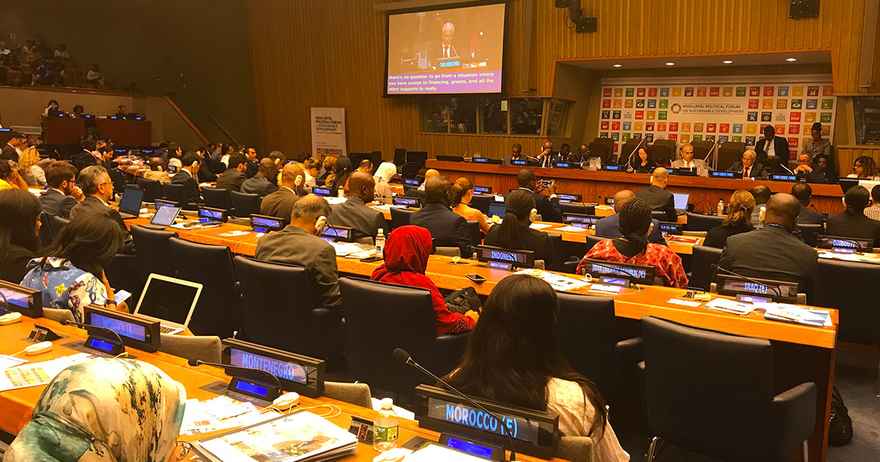Leaving no one behind: are we succeeding?

by May East
The annual UN High-Level Political Forum (HLPF) has a unique role in reviewing progress, defining policies and flagging priorities at national, regional and global levels for implementing the 2030 Agenda for Sustainable Development and achieving the SDGs.
HLPF2018 focused on the theme ‘Transformation towards sustainable and resilient societies’ and featured the presentation of 46 Voluntary National Reviews (VNRs) including 11 presentations on the final day.
The VNR process is a voluntary, state-led report, undertaken by both developed and developing countries, aimed at facilitating the sharing of experiences, including successes, challenges and lessons learned, with a view to accelerating the implementation of the 2030 Agenda.
These VNR presentations showcased country progress on the SDGs, particularly those SDGs under review at the 2018 HLPF:
- SDG 6 (Water and Sanitation)
- SDG 7 (Energy)
- SDG 11 (Sustainable Cities)
- SDG 12 (Sustainable Consumption and Production)
- SDG 15 (Terrestrial Ecosystems)
- SDG 17 (Partnerships for the Goals), which is reviewed annually

The 46 VNRs provided a good snapshot of action on the ground, but also of the numerous challenges faced by national and local actors. It was clear that some countries have gone to considerable lengths to align their national plans with the 2030 Agenda. However, capacity and financial resources, particularly in a number of developing countries, was a recurring issue. The level of participation of non-state actors in the preparation of the VNRs varied among countries in scale and depth. During the VNR presentations, some of the most challenging questions on the limits of the focus of the VNRs, and on omissions, were in fact raised by civil society organisations.
Throughout the Forum a number of speakers reiterated the need to progress beyond silos and warned that the world is not on track to fulfil the ambition of the 2030 Agenda, and in particular to “leave no one behind”. Reference was made to the fact that 82% of the wealth generated last year went to the richest 1% of the global population, while the 3.7 billion people who make up the poorest half of the world saw no increase in their wealth. Amina J. Mohammed, UN Deputy Secretary-General, referring to SDG 11, said momentum is being lost in tackling areas such as undernourishment and urban poverty. She warned against an ‘SDG-light’ approach.
Two key messages permeated the discussions: gender equality must be addressed at every point in policy making and programming, and focus needs to firmly remain on the poorest and most vulnerable.
The urgency to attract the so-called ‘trillions’ – promoted under the call of Maximizing Financing for Development – was high on the agenda. Green bonds. Innovation labs. Block-chain. Solar currency. Behavioural experimentation. Alternative finance. These – and more – have crept into the HLPF vocabulary as new approaches with the potential of unlocking new forms of financing beyond ODA while addressing the slow pace of the implementation of the SDGs.

The UN Secretary-General delivered a keynote speech before the closing session of the Forum on Wednesday, 18 July in which he stated climate change is running faster than we are. A Ministerial Declaration was adopted on the theme ‘Transformation towards sustainable and resilient societies’ during the closing session, after voting on three paragraphs relating to the means of implementation (MOI) and global partnerships; peace and security; and gender equality. The Ministerial Declaration as a whole was also put to a vote, following a request from the US. The Declaration was adopted by a vote of 164 in favour, 2 opposed, and 0 abstentions.
HLPF 2019
HLPF 2019 is scheduled to address the theme, ‘Empowering people and ensuring inclusiveness and equality’. It will conduct an in-depth review of SDG 4 (quality education), SDG 8 (decent work and economic growth), SDG 10 (reduced inequalities), SDG 13 (climate action) and SDG 16 (peace, justice and strong institutions), in addition to SDG 17 (partnerships for the Goals) which is reviewed each year. Visit the UN VNR webpage to learn more.



0 comments
Leave a comment